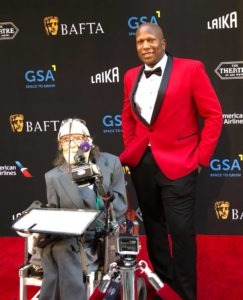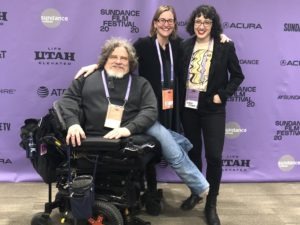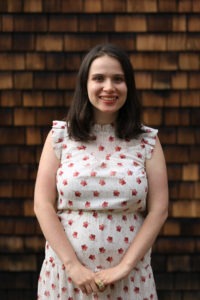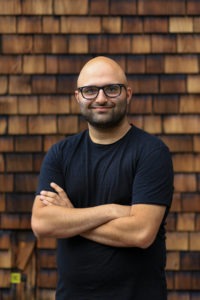Dear Berkeley Journalism Community,
As we enter National Disability Employment Awareness Month, I write to express my commitment to fostering an inclusive institution where each of you is celebrated for your abilities every day of every month.
So many people in our lives are touched by some form of disability. Some of us have sensory or cognitive impairments, others are deaf, hard of hearing, or blind. Many have respiratory illnesses like asthma or chemical sensitivities, mental health conditions, motor or mobility impairments. None of us should be defined by our disabilities. None of us should be underestimated.
Journalism doesn’t give enough attention to people with disabilities. Brad Bailey’s (’17) master’s project which won the 2017 Student Academy Award is a stunning example of how to thoughtfully report on a person with a disability.

Hale Zukas and Brad Bailey at the 2018 BAFTA Awards ceremony in Los Angeles.
His film, “Hale,” is a documentary short about Berkeley-based disability rights pioneer Hale Zukas. Zukas, who has had cerebral palsy since birth, was a frequent presence at School events over the years. Communicating only through tapping a pen on letters on his plastic tablet, few knew he was one of the country’s great disability rights activists. Bailey, whose own father was disabled after a car accident, changed all that.
I encourage each of you to watch this film, as well as the much celebrated “Crip Camp: A Disability Revolution,” about a groundbreaking summer camp in the Catskills in the 1970s. Eight Berkeley Journalism alumni worked on the film.
Both documentaries highlight the disability rights movement that started right here on the Berkeley campus in the 1960s. Back then, it was legal and common for institutions to deny admission to students with disabilities. Students like quadriplegic Ed Roberts fought to live independently and make the campus accessible to all. Their activism led UC Berkeley to become one of the first universities in the nation to begin making its campus accessible to students with disabilities.
For the past 20 years, I have been writing about a dad’s fight to save his kids who have a rare genetic disease. I wrote a book, The Cure, which was made into the Harrison Ford movie, “Extraordinary Measures,” chronicling that family’s story. The drug John Crowley helped develop saved the lives of his kids, Megan and Patrick, but they still need ventilators to breathe and wheelchairs to move around. In 2018, when Megan graduated from Notre Dame University, I wrote about her journey in this story for the Wall Street Journal. Megan’s refusal to be limited by her disabilities and her zest for life have inspired me to fight to make this School accessible to everyone.

Lauren Schwartzman (’18) (right) pictured with co-directors Nicole Newnham and Jim LeBrecht at the Sundance Film Festival.
Toward that goal, and in concert with our anti-racism plan and equity and inclusion efforts, Berkeley Journalism pledges to continue to improve the School for people with disabilities. In recent years, we had new, longer ramps built into the courtyard from campus, and from the Logan Multimedia Center. We modified one of our restrooms and our water cooler to make our space more accessible. Last year, we hired a sign language interpreter for our two largest public Zoom events.
But even as we celebrate these improvements, I want to acknowledge that parts of our building remain inaccessible to some because we have so many stairs.
Please know that I intend during my deanship to work relentlessly to make our school fully accessible to all students. That’s one more critical way we at Berkeley Journalism seek to take the limits off who gets to become a journalist in this world.
I am proud to share, below, the narratives of two of our students, Julia Métraux (‘23) and Armon Owlia (‘23), who identify as people with disabilities.
In solidarity with Julia, Armon, and all people with disabilities,
![]()
Geeta Anand
Dean and Professor
Robert A. Peck Chair
Messages from students Julia Métraux (‘23) and Armon Owlia (‘23)

Julia Métraux
With internship and job applications just around the corner, many of us are stressed about looking our best. For disabled students like myself, it can be difficult to decide whether or not to identify our disability due to discrimination, even if we need accommodations.
October is National Disability Employment Awareness Month, and there’s an important bill that was just passed in California. It is legal to pay disabled workers less than minimum wage in most states (known as subminimum wage), and Newsom just signed a bill that would end discriminatory subminimum wage in this state.
Newsrooms also lack many disabled journalists and disability reporting, an issue which I wrote about at Poynter. I cannot give you a number because, unfortunately, there are no national statistics about disability representation in newsrooms. But, the lack of presence is clear. Just look at reporting on disability. Were disabled people interviewed for an article, or only non-disabled family members? Does a newsroom have a rule against first-person language, while a growing number of the disability community prefers this type of language?
With long COVID-19, the disability community is growing (whether or not people identify as being part of this community is a personal choice). This highlights the importance of including disabled voices in our stories, see how inaccessibility affects people – and events that we may hold at Berkeley. Just look at our building – it is not accessible for wheelchair users.
I want to end this message by emphasizing that disability is not a bad thing – inaccessibility is. We have a duty as journalists to point this out in our reporting.
Julia Métraux (she/her) (‘23)
***

Armon Owlia
During her opening speech at orientation, Geeta talked about the importance of diversity, straying away from past norms, and showing how people with different backgrounds and viewpoints should be driving the conversation in both the progression and voice of journalism.
In that regard, I utterly agree and have spent much of my time advocating for disability rights, particularly neurodiversity rights (in other words, disorders and disabilities such as autism, AD/HD, and dyslexia).
I have also tried to lead by example no matter the element of my life. Whether personal or professional, I try to maintain a high standard to show that no matter what life throws, you should be able to work hard and rise above it.
Imagine going from being unable to speak, climb a flight of stairs, or hold a crayon to studying for a master’s degree at, in my mind, the best journalism school in the country, if not the world.
It’s taken a lot of work and development. As I continue to do both and speak out, I’m aware that my greatest advocacy happens when I don’t speak, but rather, take action. It hasn’t been perfect, and there have been bumps and bruises along the way, but it’s about the journey for me, not the final destination.
However, this field is not just me. In the spirit of Disability Awareness (which should also be expanded into Acceptance), I want to highlight voices who, like me, are moving the needle on being a disabled journalist.
Voices, for example, like Julia Métraux, who was born hard of hearing and has vasculitis, which has left her immunocompromised and in constant pain. She, hands down, has had a harder road than I did to get here.
It’s not a matter of competition; this is just reality.
We both advocate for people with disabilities because, as disabled people, we both realize that, especially in this industry, when one of us succeeds, we all succeed. The goal, in this case, is not to be just the first, and we want to be the first of many, many more.
We want to encourage others like us, who may be apprehensive, that not only can it be done, but we will set the bar for what comes next. Suppose those after us move that bar even further and encourage others to keep going. In that case, that’s when we’ll be satisfied, as our legacies will basically be set.
I’ve recently undertaken a project based on a YouTube series I started called “For The Community.” One of the main aspects that differentiate my project from the pack is my asking #ActuallyAutistic voices to talk about aspects related to the episode. My voice should not be the sole authority because each person with autism has a different perspective.
Now, it’s expanding to a blog and a podcast, of which there will be even more autistic voices, as I sit back and talk to them about their lives and experiences while also spreading their writing and creative muscles, talking about subjects that they feel are important for neurotypical people to understand.
At the time of writing, the website is barren, but I guarantee there will be pieces on the horizon as we begin to gather steam.
Disability Awareness and Acceptance needs to happen now. Not just in October, but every second of every day. We are also human beings, just like you. We are not the object of sympathy or pity, and we are strong and powerful. We will show we are worth our weight in gold.
Our futures and the futures of those after us depend upon it.
Armon Owlia (‘23)
